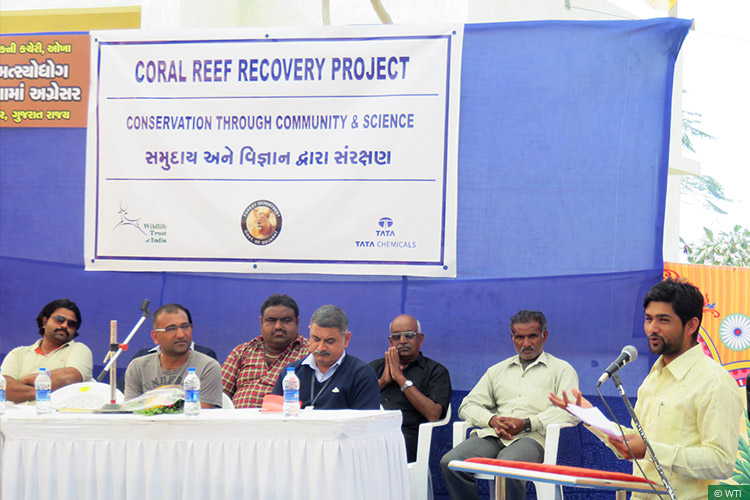 A member of WTI’s Coral Reef Recovery Project field team addresses participants of the awareness programme at Bhimrana village
A member of WTI’s Coral Reef Recovery Project field team addresses participants of the awareness programme at Bhimrana village
Bhimrana, Gujarat, February 02, 2017: In order to build awareness about the importance of coral reef ecosystems and create a sense of involvement in coral reef conservation among local fishing communities, Wildlife Trust of India (WTI), in association with Tata Chemicals Ltd (TCL) and the Gujarat Forest Department, organised a community awareness programme late last month at the fishing village of Bhimrana under the Mithapur Coral Reef Recovery Project.
The project, a collaborative effort by WTI, TCL and the forest department, aims to conserve the biodiversity of the Mithapur reef by creating artificial reefs to assist natural recruitment of corals, building fish-houses to increase the diversity of the reef, and transplanting coral fragments from the Lakshwadeep islands to aid the recovery of certain coral species.
Yet none of this can be accomplished without the support of the nearly 100 fisher families that rely on the reef for their daily livelihood. These fisher folk, who operate sailboats and small fibreglass-hulled boats without motors, hail from the nearby villages of Arambhada, Surajkaradi, Mithapur and Bhimrana. It is essential to involve them in conservation activities so that they develop a sense of ownership towards the Mithapur reef.
The awareness programme organised at Bhimrana on January 25 sought to do exactly that. Fishermen from the aforementioned villages and representatives from the fisheries department and local government attended the programme and were provided information by the project team, through audio-visual aids, on the significance (from an ecological as well as anthropogenic point of view) of coral reefs.
It is essential to involve local fishing communities in conservation activities so that they develop a sense of ownership towards the Mithapur reef.
“Being reef fishers, their activities are detrimental to the coral reef. However, it would not be ethical to ask them to leave their livelihood. They need to be made aware about the importance of reefs and how to minimise the damage caused to the Mithapur reef while fishing”, said Mr DM Makwana, Fisheries Officer, Okha Fisheries Department.
“We are proud to have such a productive marine ecosystem around Mithapur. Tata Chemicals Ltd is committed to preserving the Mithapur reef with support from local fisher communities”, declared Mr Satish Trivedi of TCL.
Speaking on behalf of the Gujarat Forest Department, Dr Mayurdan Gadhvi asserted: “Coral reefs are a significant component of the marine ecosystem and are protected under the Wild Life (Protection) Act, 1972.” He appealed to the local fishing communities to support WTI’s research and conservation activities.
As the programme came to a close, fishermen from the four villages involved in the project voluntarily pledged their support to the project’s conservation efforts in the region.
Launched in 2008, the Coral Reef Recovery Project seeks to develop and implement appropriate strategies for the conservation of the Mithapur Reef, situated 12 km south of the Gulf of Kachchh in Gujarat. The project envisions creation of a model public-private-managed coral ecosystem of international standards using global benchmarks to restore degraded reefs through activities including coral transplantation and natural recruitment. The project has thus far established 400 artificial reefs spanning an area of 1000 sq metres.